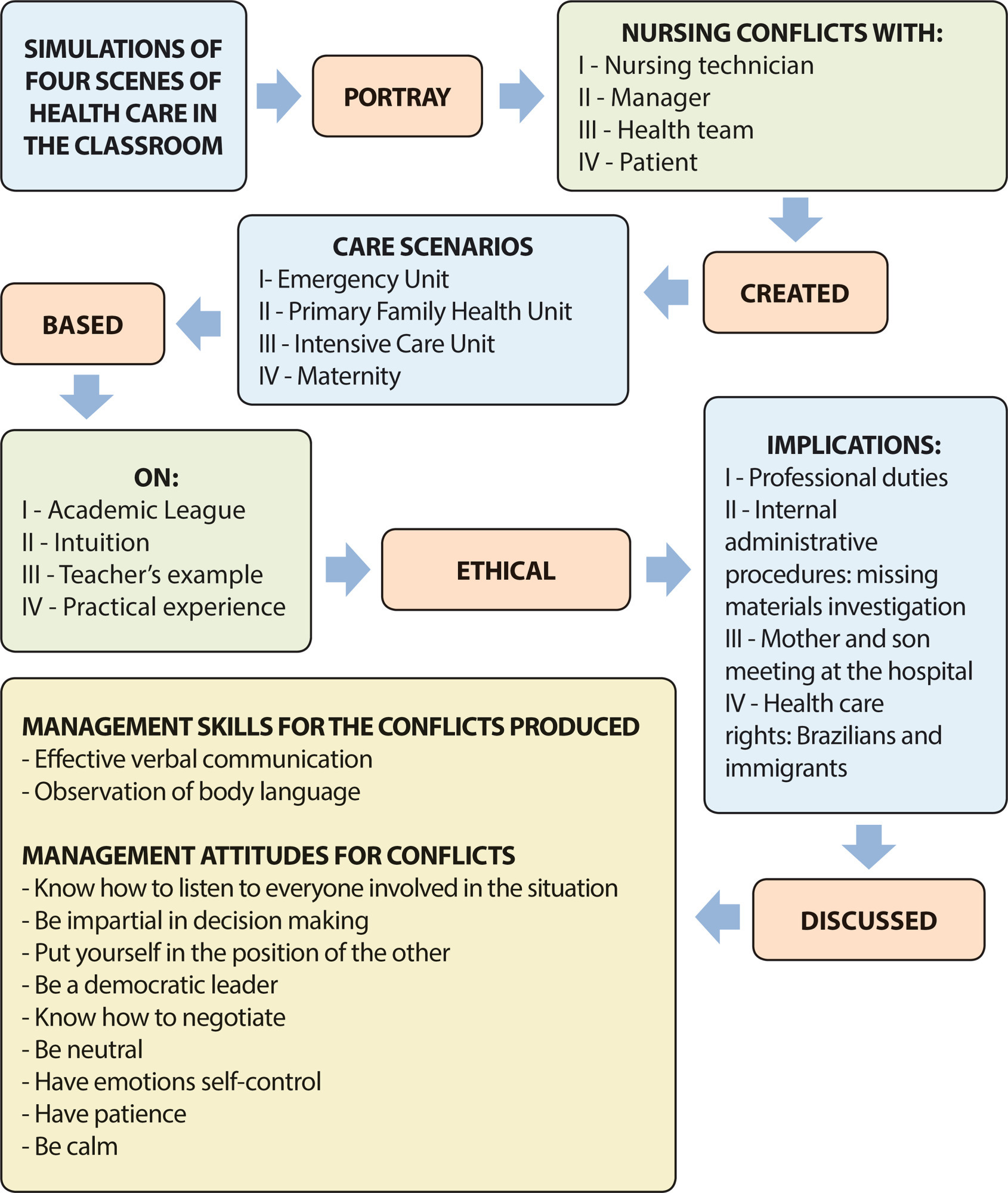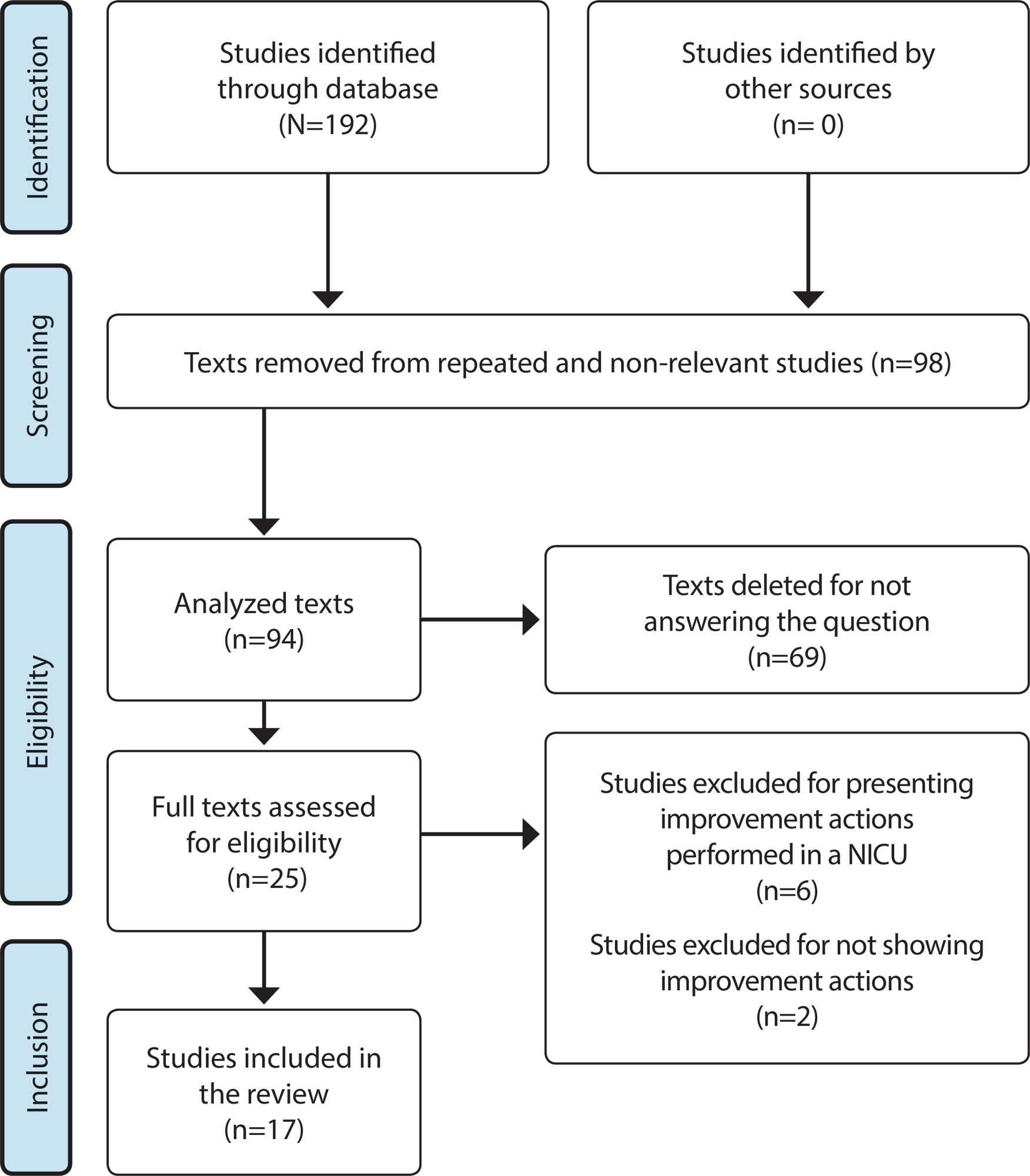-
ORIGINAL ARTICLE03-24-2021
Integration strategies for caring for chronic noncommunicable diseases: a case study
Revista Brasileira de Enfermagem. 2021;74(1):e20190563
Abstract
ORIGINAL ARTICLEIntegration strategies for caring for chronic noncommunicable diseases: a case study
Revista Brasileira de Enfermagem. 2021;74(1):e20190563
DOI 10.1590/0034-7167-2019-0563
Views0See moreABSTRACT
Objectives:
to identify the strategies for integrated care used regarding Chronic Noncommunicable Diseases in a Health District.
Methods:
a case study developed in a district of a municipality in southern Brazil, with 34 participants (coordinators and nursing assistants). Data were collected between August 2016 and June 2017, through interviews, documents and computerized files. To organize the data, the MAXQDA® software was used. Analysis took place using the Integrated Care Network model.
Results:
integration strategies were highlighted in the systemic, normative and functional dimensions, such as coordination, district organization, Annual Operating Plan, information system, and user management service.
Final Considerations:
the district comprises a structure that enables interactions through various tools; among these, coordination represents an effective strategy to enhance care, boost cooperation among professionals and support and manage the district.
-
ORIGINAL ARTICLE12-21-2020
Simulated scenes: a pedagogical experiment to reflect about conflict management in nursing care
Revista Brasileira de Enfermagem. 2020;73:e20200025
Abstract
ORIGINAL ARTICLESimulated scenes: a pedagogical experiment to reflect about conflict management in nursing care
Revista Brasileira de Enfermagem. 2020;73:e20200025
DOI 10.1590/0034-7167-2020-0025
Views0ABSTRACT
Objective:
To describe simulated scenes on conflict management in nursing care, created by university students; and to identify the skills and attitudes needed by the nursing student to manage conflicts in health care.
Methods:
This is a qualitative study conducted with 28 university nursing students from a public college located in the city of Boa Vista, Roraima. The strategy adopted for the production of data was the simulation of scenes of conflict. The data were analyzed according to Bardin’s methodology.
Results:
Four conflict scenes were produced, involving nurses and nursing technicians, health managers, multiprofessional health teams, and patient care. In this context, 274 record units were identified regarding skills and attitudes for nurses to manage conflicts.
Final Considerations:
The skills and attitudes essential for conflict management were: effective verbal communication, body language observation, knowing how to listen, negotiate, make decisions, be neutral, impartial, and how to lead democratically.
Keywords:Conflict of InterestEducation, NursingHealth Services AdministrationNursing CareSimulation TechniqueSee more
-
REVIEW11-21-2020
Quality management in Human Milk Banks: a scope review
Revista Brasileira de Enfermagem. 2020;73:e20190640
Abstract
REVIEWQuality management in Human Milk Banks: a scope review
Revista Brasileira de Enfermagem. 2020;73:e20190640
DOI 10.1590/0034-7167-2019-0640
Views0See moreABSTRACT
Objectives:
to identify the main quality management interventions used by professionals working at Human Milk Banks.
Methods:
a scope review conducted at PubMed, VHL, Scopus, SciELO, CAPES thesis and Google Scholar databases. Primary studies were included that address quality improvement strategies to improve Milk Bank processes in Portuguese, English and Spanish.
Results:
search totaled 192 scientific studies, 17 of which met the objective of the study and inclusion criteria. The main quality management interventions used in the Human Milk Bank addressed tools for continuous improvement. Six were aimed at improving processes, one to prevent errors and failures and two to achieve continuous monitoring.
Final Considerations:
the tools used by professionals working in Human Milk Banks have demonstrated effectiveness in managing the quality of services.

-
ORIGINAL ARTICLE10-28-2020
Conflict management strategies used by Portuguese nurse managers
Revista Brasileira de Enfermagem. 2020;73:e20190336
Abstract
ORIGINAL ARTICLEConflict management strategies used by Portuguese nurse managers
Revista Brasileira de Enfermagem. 2020;73:e20190336
DOI 10.1590/0034-7167-2019-0336
Views0See moreABSTRACT
Objectives:
to analyze the perception and conflict management strategies used by nurses in the management of people in Portuguese health services.
Methods:
descriptive, correlational study, carried out in Portuguese health services, with an intentional non-probabilistic sample, totaling 95 nurse managers. A questionnaire and Conflict Management Scale were used, analyzing the variables of managerial activities and conflict management, with the aid of software.
Results:
it was identified that 60% of the managers, report having to mediate conflicts daily, and the majority report adopting dialogue in conduct. However, through the Kruskal-Wallis test, it was shown that enforcement strategies in conflict management prevail (p = 0.008), with collaborative ones being more restricted to monthly intervals (p = 0.049).
Conclusions:
managers perceive the importance of collaboration in the mediation of conflicts, however, in their daily lives; they tend to maintain imposing behaviors, signaling for a little transformational leadership style.

-
REVIEW08-14-2020
Nursing practice environment in Primary Health Care: a scoping review
Revista Brasileira de Enfermagem. 2020;73(6):e20190479
Abstract
REVIEWNursing practice environment in Primary Health Care: a scoping review
Revista Brasileira de Enfermagem. 2020;73(6):e20190479
DOI 10.1590/0034-7167-2019-0479
Views0INTRODUCTION Knowledge and scientific evidence about nursing practice environments (NPE) in the context of Primary Health Care (PHC) is scarce. Policy makers, health and professional organizations have proposed to redesign the health system in PHC with the aim of increasing citizens’ accessibility, improving customer outcomes and maximizing efficiency. […]See more
-
EXPERIENCE REPORT02-01-2019
Community assembly as a promotion of participatory management in healthcare
Revista Brasileira de Enfermagem. 2019;72:331-335
Abstract
EXPERIENCE REPORTCommunity assembly as a promotion of participatory management in healthcare
Revista Brasileira de Enfermagem. 2019;72:331-335
DOI 10.1590/0034-7167-2017-0642
Views0ABSTRACT
Objective:
To report the participatory management experience of a Family Health Strategy by means of community assemblies.
Methods:
Community assemblies were performed with the population of a Family Health Strategy center in the city of Criciúma/SC. The meetings occurred between 2016 and 2017, including health care professionals, managers, members of the organized civil society and the healthcare system clients.
Results:
The activity enable us to rethink the teamwork process regarding the system of health appointment scheduling and the replication of this process for all the family health teams of the municipality.
Final remarks:
Participatory management provided opportunities for new collective spaces that facilitate the democratization of healthcare in order to mobilize the role of the health system client in the development of more welcoming, resolute and integral health practices.
Keywords:Community ParticipationDecentralizationHealth Services AdministrationUnified Health System Primary HealthcareSee more -
Charismatic leadership among nursing professionals: an integrative review
Revista Brasileira de Enfermagem. 2019;72:315-320
Abstract
Charismatic leadership among nursing professionals: an integrative review
Revista Brasileira de Enfermagem. 2019;72:315-320
DOI 10.1590/0034-7167-2017-0743
Views0See moreABSTRACT
Objective:
Analyze the literature for knowledge about charismatic leadership among nursing professionals.
Method:
This is an integrative review of the literature that searched for studies published in English, Portuguese and Spanish until 2016 in the following electronic databases: LILACS, Pubmed, SCOPUS, Web of Science, and CINAHL.
Results:
Three studies were selected from a total of twenty-one studies; they were arranged in two categories: validation of a charismatic leadership instrument and effects of charismatic leadership on followers' initiative-oriented behavior.
Conclusion:
Charismatic leadership is considered an important skill for nursing professionals as they generate a positive influence on followers, especially in times of crisis and changes. Considering the relevance of this style of leadership, the need to develop further studies on this subject is reinforced, given the low number of studies found in the literature.
-
ORIGINAL ARTICLE01-01-2019
Knowledge of responsible technical nurses on management skills: a qualitative study
Revista Brasileira de Enfermagem. 2019;72(1):43-48
Abstract
ORIGINAL ARTICLEKnowledge of responsible technical nurses on management skills: a qualitative study
Revista Brasileira de Enfermagem. 2019;72(1):43-48
DOI 10.1590/0034-7167-2017-0761
Views0See moreABSTRACT
Objective:
To identify the knowledge of responsible technical nurses in relation to the general and management skills required to perform this function.
Method:
Qualitative case study with 14 nurses. The semi-structured interviews were recorded and the data analyzed through the thematic content analysis.
Results:
Two categories stood out: Main Responsibilities for the Position of Technical Manager: Leadership, Interpersonal Relationship and Systemic view; and Developing Skills: Dissociation between Theory and Practice.
Final considerations:
The fact that only three skills have been recognized as necessary for the exercise of the function of technical leader and the perception of the interviewees about the dissociation between theory and practice during graduation should be explored by the teaching and health institutions, because to exercise this nurses must develop the technical-scientific, socio-educational and ethical-political skills to be able to lead the organization to positive results..



